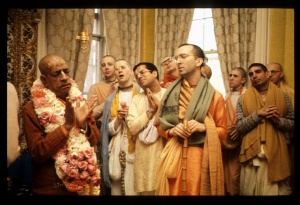CC Antya 3.201 (1975): Difference between revisions
(Vanibot #0027: CCMirror - Mirror CC's 1996 edition to form a basis for 1975) |
(Vanibot #0020: VersionCompareLinker - added a link to the Version Compare feature) |
||
| Line 2: | Line 2: | ||
<div style="float:left">'''[[Sri Caitanya-caritamrta (1975)|Śrī Caitanya-caritāmṛta (1975)]] - [[CC Antya (1975)|Antya-līlā]] - [[CC Antya 3 (1975)|Chapter 3: The Glories of Śrīla Haridāsa Ṭhākura]]'''</div> | <div style="float:left">'''[[Sri Caitanya-caritamrta (1975)|Śrī Caitanya-caritāmṛta (1975)]] - [[CC Antya (1975)|Antya-līlā]] - [[CC Antya 3 (1975)|Chapter 3: The Glories of Śrīla Haridāsa Ṭhākura]]'''</div> | ||
<div style="float:right">[[File:Go-previous.png|link=CC Antya 3.200 (1975)|Antya-līlā 3.200]] '''[[CC Antya 3.200 (1975)|Antya-līlā 3.200]] - [[CC Antya 3.202 (1975)|Antya-līlā 3.202]]''' [[File:Go-next.png|link=CC Antya 3.202 (1975)|Antya-līlā 3.202]]</div> | <div style="float:right">[[File:Go-previous.png|link=CC Antya 3.200 (1975)|Antya-līlā 3.200]] '''[[CC Antya 3.200 (1975)|Antya-līlā 3.200]] - [[CC Antya 3.202 (1975)|Antya-līlā 3.202]]''' [[File:Go-next.png|link=CC Antya 3.202 (1975)|Antya-līlā 3.202]]</div> | ||
{{CompareVersions|CC|Antya 3.201|CC 1975|CC 1996}} | |||
{{RandomImage}} | {{RandomImage}} | ||
==== TEXT 201 ==== | ==== TEXT 201 ==== | ||
| Line 11: | Line 10: | ||
<div class="verse"> | <div class="verse"> | ||
:balāi-purohita tāre karilā bhartsana | :balāi-purohita tāre karilā bhartsana | ||
: | :"ghaṭa-paṭiyā mūrkha tuñi bhakti kāṅhā jāna? | ||
</div> | </div> | ||
| Line 25: | Line 24: | ||
<div class="translation"> | <div class="translation"> | ||
The priest named Balarāma Ācārya | The priest named Balarāma Ācārya chastised Gopāla Cakravartī. "You are a foolish logician," he said, "What do you know about the devotional service of the Lord? | ||
</div> | </div> | ||
| Line 32: | Line 31: | ||
<div class="purport"> | <div class="purport"> | ||
The philosophy enunciated by the Māyāvādīs is called ghaṭa-paṭiyā | The philosophy enunciated by the Māyāvādīs is called ghaṭa-paṭiyā philosophy. According to this philosophy, everything is one, everything is earth, and therefore anything made of earth, such as different pots, is also the same earth. Such philosophers see no distinction between a pot made of earth and the earth itself. Since Gopāla Cakravartī was a ghaṭa-paṭiyā logician, a gross materialist, what could he understand about the transcendental devotional service of the Lord? | ||
</div> | </div> | ||
Latest revision as of 01:14, 27 January 2020

A.C. Bhaktivedanta Swami Prabhupada
TEXT 201
- balāi-purohita tāre karilā bhartsana
- "ghaṭa-paṭiyā mūrkha tuñi bhakti kāṅhā jāna?
SYNONYMS
balāi-purohita—the priest named Balarāma Ācārya; tāre—unto Gopāla Cakravartī; karilā—did; bhartsana—chastisement; ghaṭa-paṭiyā—interested in the pot and the earth; mūrkha—fool; tuñi—you; bhakti—devotional service; kāṅhā—what; jāna—do know.
TRANSLATION
The priest named Balarāma Ācārya chastised Gopāla Cakravartī. "You are a foolish logician," he said, "What do you know about the devotional service of the Lord?
PURPORT
The philosophy enunciated by the Māyāvādīs is called ghaṭa-paṭiyā philosophy. According to this philosophy, everything is one, everything is earth, and therefore anything made of earth, such as different pots, is also the same earth. Such philosophers see no distinction between a pot made of earth and the earth itself. Since Gopāla Cakravartī was a ghaṭa-paṭiyā logician, a gross materialist, what could he understand about the transcendental devotional service of the Lord?